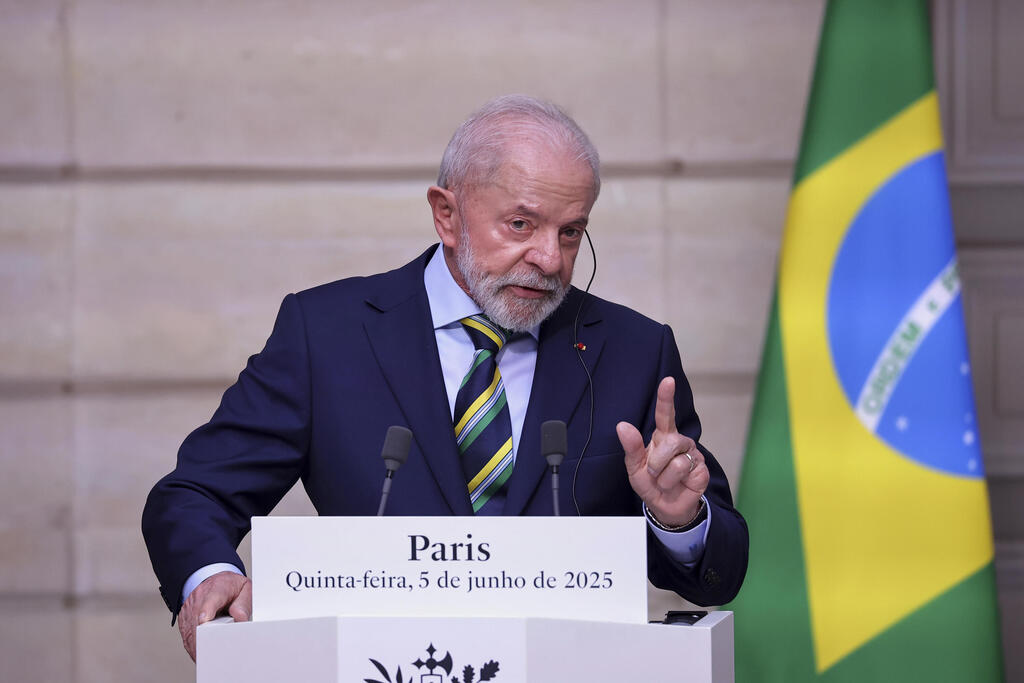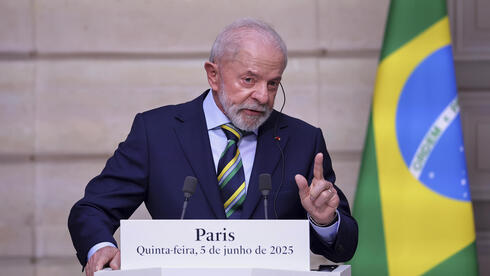3 View gallery


Brazilian President Luiz Inácio Lula da Silva
(Photo: Christophe Petit Tesson, Pool Photo via AP)
Gelblung explained that IHRA membership is not ceremonial. “Observer status allows states to learn, contribute and share best practices. Brazil is now cutting off its own experts from those global exchanges. That’s a loss for Brazil, not for IHRA.”
The Brazilian government justified the withdrawal on two grounds: the lack of congressional authorization to pay the €10,000 annual membership fee, and legal concerns raised by UN rapporteurs regarding the compatibility of the IHRA’s working definition of antisemitism with freedom of expression. Experts swiftly dismissed both arguments.
Fernando Lottenberg, antisemitism commissioner at the Organization of American States, called the financial rationale “a bureaucratic excuse.” “If the government wants to stay, this could be resolved. The contribution is modest and manageable. The legal explanation reflects a misunderstanding of what IHRA actually does and what its definition of antisemitism entails.”
Brazil never formally adopted the IHRA definition at the federal level but did join as an observer in 2021. Lottenberg noted that Lula’s government has long been uncomfortable with the affiliation. “One should not mix up antisemitism with Middle East policy, using one to justify distancing itself from the other. But they’re not the same. You can criticize Israel’s government without exiting a respected institution dedicated to Holocaust education and memory.”
That confusion, Lottenberg added, is now costing Brazil its international standing. “The IHRA fights Holocaust distortion, antisemitism and trivialization. Rejecting that sends the wrong message — not just to Jews, but to any democracy.”
The decision has drawn criticism within Brazil. Congresswoman Tabata Amaral submitted an official request for information demanding answers from Foreign Minister Mauro Vieira. In her letter, she questions the lack of transparency, the absence of civil society consultation and the contradiction between the withdrawal and Brazil’s stated human rights commitments. “The IHRA definition is used by over 45 countries and 2,000 institutions globally,” she wrote, citing Lottenberg. “Brazil’s exit undermines its credibility and jeopardizes its commitment to Holocaust education.”
Despite the federal decision, state-level efforts remain intact. Twelve Brazilian states — including São Paulo, Rio de Janeiro, Goiás and the Federal District — have independently adopted the IHRA definition. “These are Brazil’s most populous and Jewishly significant regions,” said Gelblung. “And they’re not backing down.”
In Goiás, the first state to adopt the definition, Gov. Ronaldo Caiado inaugurated a memorial grove — Am Yisrael Chai — with 1,200 trees honoring the victims of the Oct. 7 Hamas attacks. The gesture was seen as a direct response to Lula’s comments and a reaffirmation of Brazil’s pluralistic identity.
Lottenberg also highlighted positive developments elsewhere in the region. “Just last week, Costa Rica fully adopted the IHRA working definition, including its examples, after a long consultation process. And Panama joined the Global Guidelines for Countering Antisemitism, an international framework launched in Buenos Aires in 2023 by special envoys and commissioners against antisemitism. These developments show that Latin America is not moving in only one direction.”
For Gelblung, the trend is even more concerning. “We are watching a bloc form — Lula, Sánchez, Boric, Petro — who claim to be defenders of democracy while redefining its very meaning. It’s the same playbook: hijack terms like apartheid, genocide, Zionism and now democracy itself.”
The next term at risk, he warned, is Holocaust. “If they succeeded in distorting ‘apartheid’ and now attempt to redefine ‘genocide,’ Holocaust trivialization is next. That’s why institutions like IHRA are essential. They protect the integrity of history.”
Lottenberg believes the decision may still be reversible. “There are people within the Brazilian government who understand this is not correct. The funding issue can be resolved, and participation in IHRA does not require adopting the definition. It’s about staying connected to a global effort against antisemitism and Holocaust denial and distortion.”
Gelblung, however, was blunt: “I don’t believe they’ll reverse it. Brazil hasn’t even answered IHRA’s formal response, which challenged the legal justification and offered to open dialogue.”
He added that the timing is especially painful. “Argentina just assumed the rotating presidency of IHRA. Their goal was to bring the alliance closer to Latin America — not to stand alone. Brazil’s exit undermines that vision.”
Still, Gelblung remains committed to regional solidarity. “We won’t abandon our brothers in Brazil. Jewish institutions, educators and allies will continue speaking out and defending the truth. Lula won’t be in power forever. Democracies can correct their course.”
As the war in Gaza enters its 22nd month and global polarization intensifies, Brazil’s departure from IHRA is more than a diplomatic footnote. “What Brazil is losing,” said Gelblung, “is the opportunity to be part of the solution. And what it’s signaling is far more troubling: that even memory is now up for negotiation.”






